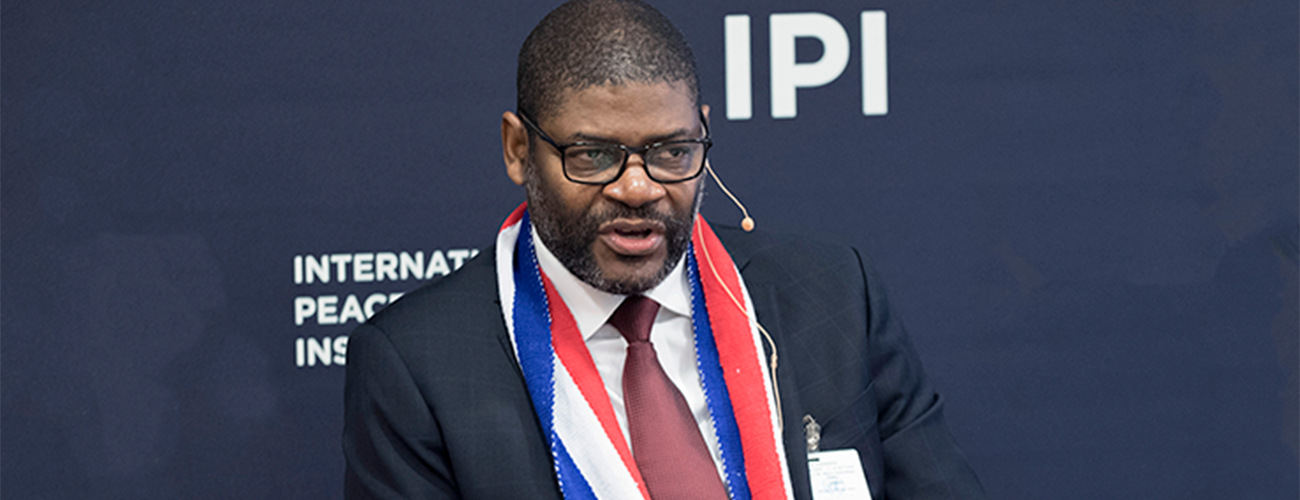Gbehzohngar Findley, Liberia’s Minister of Foreign Affairs, told an IPI Global Leaders Series event on September 26th that the country’s new development framework, the Pro-Poor Agenda for Prosperity and Development, aimed to benefit the vulnerable, promote inclusion and align with the sustainable development goals (SDGs).
“We are still in the process of developing the Pro-Poor Agenda, but the concept is based entirely on the SDGs,” he said of the plan, due to be launched at the end of the year. “All of what we are trying to do in terms of moving people from poverty to a decent living standard is based on the SDGs: women, youth, the rule of law, addressing corruption, improving institutions, and increasing capacity.”
Liberia, a country that in recent decades has experienced political instability, a military coup, depressed commodity prices, persistent corruption, two civil wars, and an Ebola virus epidemic, has in the past year negotiated two successful and peaceful transitions. The first was the vote in October and December of 2017 in which George Weah was elected President, succeeding Ellen Johnson-Sirleaf, and the second was the formal conclusion of the United Nations Mission in Liberia (UNMIL) after nearly 15 years of work in the country.
Olof Skoog, Permanent Representative of Sweden to the UN and Chair of the UN Peacebuilding Commission’s Liberia Configuration since 2016, congratulated the country on its having produced local government and land reform acts and said, “The more you can do to ensure that the SDGs are part of your development national plan, there you have an excellent master plan for avoiding falling back into conflict.”
He acknowledged that many countries think that “being on a UN agenda, being on the agenda of the Security Council, on the Peacebuilding Commission, it’s intrusive, it’s a violation of sovereignty.” But he praised the Liberians for instead engaging in collaborative peacebuilding while maintaining the necessary local ownership.
Liberia was on the formal agenda of the UN Security Council for an extended period of time, with enhanced focus starting in 2003 with the establishment of the UN Mission in Liberia (UNMIL). Liberia was formally taken off the Security Council’s agenda in March 2018 following the mission’s close. Liberia was formally placed on the Peacebuilding Commission’s agenda in September 2010.
A lot of work remained to be done in erasing the corruption that undermined people’s faith in government and serves to discourage needed investment, he said. “Corruption isn’t just about donors being skeptical, or about putting money forward. More importantly, it’s about the people of Liberia trusting their institutions and trusting democracy.”
Trokon T. Kpui, Liberia’s Minister of State Without Portfolio, reported that the new government was taking steps to “tackle” corruption by increasing both transparency and accountability. He said special attention was being paid to money coming from abroad. “We are saying for accountability purposes that if resources were brought into the country, we want to know how much and how it was infused in the system, so that’s the first thing we did, and that’s one of the key instruments to trying to solve corruption.”
Ahunna Eziakonwa, Assistant Secretary-General and Director of the Regional Bureau for Africa at the UN Development Programme (UNDP), said there were two groups without whom the SDGs cannot be achieved—youth and women—and that both were well represented in the Liberian plan. In that connection, she pointed out that the country had had a woman president and now has a young one. Mr. Weah is 51.
“Liberia is demonstrating leadership…as we move in the direction of policies that allow the resources of a country to work for its people,” she said. “That is the development that we can get behind. That is the principle of ‘leaving no one behind’ that underpins the SDGs.”
Mr. Findley said that in the end, “Liberia can only be rebuilt by Liberians, and I have no doubt that almost all Liberians are willing to rebuild Liberia.”
The event was sponsored by IPI, UNDP, and the government of Liberia, and it was moderated by Warren Hoge, IPI’s Senior Adviser for External Relations.








